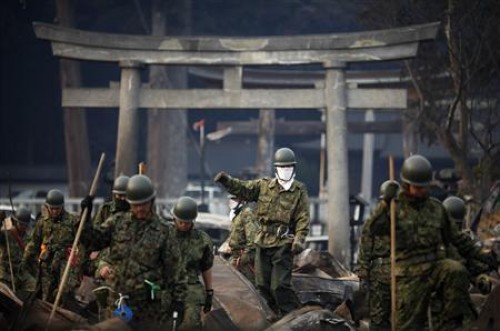Fire at Japan nuclear reactor heightens radiation threat
16 Μαρτίου 2011

Japan raced to avert a catastrophe after fire broke out on Wednesday at a nuclear plant that has sent low levels of radiation wafting into Tokyo, prompting some people to flee the capital and triggering growing international alarm at the escalating crisis.
The operator of the quake-crippled plant said workers were trying to put out the blaze at the building housing the No.4 reactor of the nuclear facility in Fukushima, 240 km (150 miles) north of Tokyo.
Experts say spent fuel rods in a cooling pool at the reactor could be exposed by the fire and spew more radiation into the atmosphere. Japan’s Nuclear and Industrial Safety Agency said two workers were missing after blasts at the facility a day earlier blew a hole in the building housing the No. 4 reactor.
In the first hint of international frustration at the pace of updates from Japan, Yukiya Amano, director general of the International Atomic Energy Agency, said he wanted more timely and detailed information.
«We do not have all the details of the information so what we can do is limited,» Amano told a news conference in Vienna. «I am trying to further improve the communication.»
The U.S. Department of Energy said it had sent a team of 34 people to help Japan with the crisis.
Japanese Prime Minister Naoto Kan on Tuesday urged people within 30 km (18 miles) of the facility — a population of 140,000 — to remain indoors, as authorities grappled with the world’s most serious nuclear accident since the Chernobyl disaster in Ukraine in 1986.
Officials in Tokyo said radiation in the capital was 10 times normal at one point but not a threat to human health in the sprawling high-tech city of 13 million people.
Toxicologist Lee Tin-lap at the Chinese University of Hong Kong said such a radiation level was not an immediate threat to people but the long-term consequences were unknown.
«You are still breathing this into your lungs, and there is passive absorption in the skin, eyes and mouth and we really do not know what long-term impact that would have,» Lee told Reuters by telephone.
Winds over the plant will blow from the north along the Pacific coast early on Wednesday and then from the northwest toward the ocean during the day, the Japan Meteorological Agency said.
Fears of transpacific nuclear fallout sent consumers scrambling for radiation antidotes in the U.S. Pacific Northwest and Canada. Authorities warned people would expose themselves to other medical problems by needlessly taking potassium iodide in the hope of protection from cancer.
The nuclear crisis and concerns about the economic impact from last week’s earthquake and tsunami hammered Japan’s stock market on Tuesday.
The Nikkei index fell as much as 14 percent before ending down 10.6 percent, compounding a slide of 6.2 percent the day before. The two-day fall has wiped some $620 billion off the market.
Authorities have spent days desperately trying to prevent the water which is designed to cool the radioactive cores of the reactors from evaporating, which would lead to overheating and the release of dangerous radioactive material into the atmosphere.
Source: http://www.reuters.com/article/2011/03/15/us-japan-quake-idUSTRE72A0SS20110315





